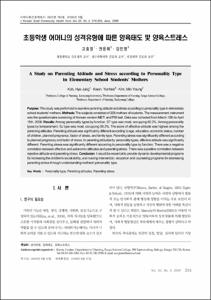초등학생 어머니의 성격유형에 따른 양육태도 및 양육스트레스
- Keimyung Author(s)
- Koh, Hyo Jung
- Department
- Dept. of Nursing (간호학)
- Journal Title
- 지역사회간호학회지
- Issued Date
- 2009
- Volume
- 20
- Issue
- 2
- Abstract
- Purpose: This study was performed to examine parenting attitude and stress according to personality type in elementary school students' mothers. Methods: The subjects consisted of 206 mothers of students. The measurement instrument was the questionnaire consisting of Korean-version MBTI and PSI test. Data was collected from March 15th to April 15th, 2008. Results: Among personality types by function, ST type was most, occupying 60.2%. Among personality types by temperament, SJ type was most, occupying 59.2%. The score of affective attitude was highest among the parenting attitudes. Parenting attitude was significantly different according to age, education, economic status, number of children, planned pregnancy, factor of stress, and family type. Parenting stress was significantly different according to planned pregnancy and factor of stress. In parenting attitudes by personality types, affective attitude was significantly different. Parenting stress was significantly different according to personality type by function. There was a negative correlation between affective and autonomic attitudes and parenting stress. There was a positive correlation between rejective attitude and parenting stress. Conclusion: It would be essential to provide dynamic developmental programs for increasing the children's social ability, and nursing intervention, education and counseling programs for decreasing parenting stress through understanding mothers' personality type.
Purpose: This study was performed to examine parenting attitude and stress according to personality type in elementary school students' mothers. Methods: The subjects consisted of 206 mothers of students. The measurement instrument was the questionnaire consisting of Korean-version MBTI and PSI test. Data was collected from March 15th to April 15th, 2008. Results: Among personality types by function, ST type was most, occupying 60.2%. Among personality types by temperament, SJ type was most, occupying 59.2%. The score of affective attitude was highest among the parenting attitudes. Parenting attitude was significantly different according to age, education, economic status, number of children, planned pregnancy, factor of stress, and family type. Parenting stress was significantly different according to planned pregnancy and factor of stress. In parenting attitudes by personality types, affective attitude was significantly different. Parenting stress was significantly different according to personality type by function. There was a negative correlation between affective and autonomic attitudes and parenting stress. There was a positive correlation between rejective attitude and parenting stress. Conclusion: It would be essential to provide dynamic developmental programs for increasing the children's social ability, and nursing intervention, education and counseling programs for decreasing parenting stress through understanding mothers' personality type.
- Alternative Title
- A Study on Parenting Attitude and Stress according to Personality Type in Elementary School Students` Mothers
- Keimyung Author(s)(Kor)
- 고효정
- Publisher
- College of Nursing
- Citation
- 고효정 et al. (2009). 초등학생 어머니의 성격유형에 따른 양육태도 및 양육스트레스. 지역사회간호학회지, 20(2), 215–224.
- Type
- Article
- ISSN
- 1225-9594
- Appears in Collections:
- 2. College of Nursing (간호대학) > Dept. of Nursing (간호학)
- 파일 목록
-
-
Download
 oak-bbb-05040.pdf
기타 데이터 / 637.1 kB / Adobe PDF
oak-bbb-05040.pdf
기타 데이터 / 637.1 kB / Adobe PDF
-
Items in Repository are protected by copyright, with all rights reserved, unless otherwise indicated.